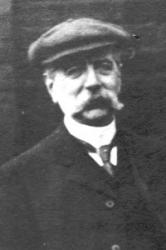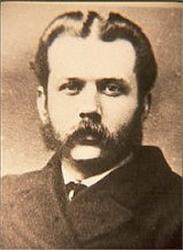Planning worship?
Check out our sister site, ZeteoSearch.org,
for 20+ additional resources related to your search.
- |
User Links
Person Results
Walter Eli Yoder
1889 - 1964 Person Name: W. E. Yoder Arranger of "[Saviour, teach me, day by day]" in Junior Hymns
Walter Eli Yoder
J. H. Rosecrans
1845 - 1926 Composer of "[Savior, teach me, day by day]" in Epworth Songs James Holmes Rosecrans studied at the Baxter University of Music in Friendship, New York. After teaching for two years, he joined the Fillmore Brothers Music House in Cincinnati, Ohio. As of 1880, he was teaching music in Douglas County, Colorado. In 1884, was an evangelist in California, and later was associated with evangelistic efforts in Texas, and taught music and Bible at Carlton College in Bonham, Texas. He published over 20 music collections in his lifetime.
© The Cyber Hymnal™ (www.hymntime.com/tch)
J. H. Rosecrans
Henry J. E. Holmes

1852 - 1938 Person Name: H. J. E. Holmes Composer of "[Saviour! teach me, day by day]" in The Spirit of Praise Born: March 5, 1852, Burnley, Lancashire, England.
Died: October 1938, Burnley, Lancashire, England.
Buried: Burnley, Lancashire, England.
Son of Richard and Jane Holmes, Henry’s father and great grandfather were both solicitors; his father had offices in Colne and Burnley. Henry was educated at Clitheroe Royal Grammar School. In 1875, he became an Attorney for Common Law and was admitted a Solicitor of the High Court of Chancery. He was articled to his father in November 1869, and practiced in Burnley for over 60 years, first in partnership with his brother Richard Marmaduke as Holmes and Holmes. He continued to practice on his own as Holmes and Holmes after his brother’s death in 1894, and later as Messrs. Holmes, Butterfield and Hartley. Holmes had moved from the family home on Westgate some time after the death of his sister Susannah in 1878. By 1881, he was living at 12 Palatine Square.
Holmes was intimately associated with church and Sunday school work all his life. At age 17, he became a teacher and later a lay superintendent of Sandygate Sunday school, connected with Holy Trinity Church, a position he held nearly 20 years. From the 1880’s he took a deep interest in "The Home for Little Boys" at Farningham, Kent. His desire to help in this work led to the formation of the Burnley branch of the National Society for the Prevention of Cruelty to Children. Another organization that Holmes took a great interest in was the Burnley Law Society, which he helped found in 1883; he lived to be the last survivor of the eight founders.
Holmes is said to have written over 250 hymn tunes in his life.
--www.hymntime.com/tch/
Henry J. E. Holmes
Herbert B. Turner
1852 - 1927 Person Name: Rev. Herbert B. Turner (1852- ) Composer of "GIBSON" in Carmina for the Sunday School and Social Worship Turner, Herbert Barclay; b. 1852, Brooklyn, New York, d. 1927, Washington, Connecticut; composer
Herbert B. Turner
Vincent Novello
1781 - 1861 Person Name: Novello Composer of "[Saviour! teach me, day by day]" in The Sunday School Hymnal
Vincent Novello
J. H. Cornell
1828 - 1894 Composer of "[Saviour, teach me, day by day]" in Hosanna for the Sunday School An organist for St. Paul’s Chapel, Trinity Church, Cornell compiled the Congregational Tune Book in 1872.
--www.hymntime.com/tch/
J. H. Cornell
Philip Armes

1836 - 1908 Person Name: Philip Armes, Mus. Doc. Composer of "[Saviour! teach me, day by day]" in The Hymnal, Revised and Enlarged, as adopted by the General Convention of the Protestant Episcopal Church in the United States of America in the year of our Lord 1892 Philip Armes, born in Norwich,England, Aug. 15, 1836. Organist; chorister in Norwich Cathedral in 1846-48, and in Rochester Cathedral 1848-51; articled pupil of Dr. John Larkin Hopkins at Rochester, 1850-55; was organist of Trinity Church, Milton, Gravesend in 1855-57, at St. Andrew's, Wells Street, London, in 1857-61, of Chichester Cathedral in 1861-62, and of Durham Cathedral since 1862. Mus. Bac., Oxford 1858; Mus. Doc., Oxford, 1865. degrees also from University of Durham, 1863-1864. Works: Hezekiah, oratorio, performed at Worcester Festival, 1878; St. John the Evangelist, do., York Festival 1881; Communion Services in A; do. in B-flat; Te Deum; Morning and Evening Service in G; Anthems; Chants; Hymns, etc.
Cyclopedia of Music and Musicians by John Denison Camplin, Jr. and William Foster Apthorp (Charles Scribner’s Sons, 1888)
Philip Armes
Samuel Weekes
Person Name: S. Weekes Composer of "BURLEIGH" in Hymns and Tunes for Schools
Samuel Weekes
J. C. Ewing
1849 - 1937 Composer of "WARNER" in The Brethren Hymnody John Cook Ewing (1849-1937), who usually referred to himself as J.C. Ewing, was the pioneer Brethren musician, music teacher and composer. Before providing a synopsis of Ewing’s life and work it is appropriate to identify the Brethren of whom we are speaking, for several denominations have the term Brethren in their names, and to relate the religious and hymnological culture within which J. C. Ewing served.
In the nineteenth century this particular body called themselves The Fraternity of German Baptists and the German Baptist Brethren. Their beginnings in 1708 were in the little village of Schwarzenau, Germany under the leadership of Alexander Mack Sr. (1679-1735). Due to religious persecution of Anabaptists, most of these Brethren emigrated for America by the 1730’s. By the 1880’s the Brethren were divided over several issues: notably whether or not they should be engaged in higher education, have Sunday Schools, participate in evangelistic endeavors, call persons to serve in foreign missions, sing from hymnals with musical notation, and use musical instruments in worship. The controversies led to schism and the establishment of three distinct Brethren groups: the more cautious, conservative parent body which retained the name German Baptist Brethren, a more “progressive” wing known as The Brethren Church, and the ultra-conservatives who referred to themselves as the Old German Baptist Brethren. Today there are several groups which share this common heritage: the German Baptist Brethren (renamed the Church of the Brethren in 1908, with administrative offices in Elgin, Illinois), The Brethren Church headquartered in Ashland, Ohio, The Fellowship of Grace Brethren Churches, Winona, Lake, Indiana (also known for business purposes as Charis Fellowship), the Conservative Grace Brethren Churches International, the Old German Baptist Brethren New Conference, and the Dunkard Brethren Church.
The first Brethren hymnal in America was Das Kleine Davidische Psalterspiel der Kinder Zions (the Small Davidic Psaltery of the Children of Zion), a hymnbook for which early Brethren leaders and the prominent colonial American printer, Christopher Sauer, collaborated for its production in Germantown, Pennsylvania. In 1791 came the fifth edition of the Psalterspiel, and also the first English language hymnal of the Brethren, The Christian’s Duty. With this English language hymnbook began the second of two entirely separate tracks of Brethren hymnals in the nineteenth century. Over the course of the century there was a gradual shift to the English language among the Brethren and the demise of their hymnic heritage and original piety.
During the first half of the nineteenth century the Brethren patterned their worship services according to what they believed to be the primitive church’s inclusions of singing, praying, reading Scripture, and preaching. Congregational hymn singing was “lined” and often led by a deacon serving as song leader (Vorsänger). Hymns were sung slowly and thoughtfully, with every stanza of a hymn sung, and rendered unaccompanied and in unison. Although it was stated at the denomination’s Annual Meeting of 1844 that four-part harmony was not acceptable as well as the use of musical instruments, four-part singing was evidenced in some Brethren congregations.
Brethren hymnbooks in mid-century continued to be printed without musical notation. According to Annual Meeting decisions in 1825 and 1838, Brethren were also prohibited from providing a meeting place for or teaching in “singing schools.” The prohibition was moderated in later meetings (1862, 1874), most likely due to the fact that there was an interest in learning how to sing, and the pioneer Brethren musician traveled as a singing school teacher.
John Cook Ewing, born near Benton, Holmes County, Ohio May 8, 1849, studied music with some of the foremost teachers of that era, including composer George Frederick Root of Chicago. Ewing became a skilled organist, pianist and song leader, a prolific composer of hymn tunes, and a very competent music teacher. Before the divisions of the early 1880’s, he served as the first instructor of music at the Brethren-affiliated Huntingdon Normal School (later Juniata College) in Huntingdon, Pennsylvania. He was entrusted with the 1879 revision of The Brethren’s Tune and Hymn Book (1872), the first Brethren hymnal with musical notation, set with shape-notes. Included were seventeen hymn tunes composed by Ewing.
After the schism J. C. Ewing affiliated with The Brethren Church and was invited to be the first professor of music at the denomination’s newly established institution of higher learning, Ashland College, Ashland, Ohio. He was also called upon to serve as compiler and editor of the first of only two hymnals produced by The Brethren Church, The Brethren Hymnody with Tunes (for Sanctuary, Sunday School, Prayer Meeting, and Home Circle), published by J. C. Ewing in 1884 at Wilmington, Ohio, and set in round-note musical notation. Ewing contributed fourteen tunes to this hymnal.
John Cook Ewing spent most of his career as a public school music teacher. He was teacher and music supervisor for the Lebanon, Ohio schools, and later the first music teacher of the South Bend, Indiana public schools. He also served as music director and deacon at the South Bend Brethren Church. In his later years he was music director at the First Brethren Church of Dayton, Ohio. Ewing died in Dayton May 27, 1937 and was buried in the Bear Creek Cemetery on Union Road in Dayton.
Peter E. Roussakis
J. C. Ewing
S. M. Bixby
1833 - 1912 Composer of "[Saviour, teach me, day by day]" in The Church and Home Hymnal Samuel M. Bixby was born on May 27, 1833 in Haverhill, New Hampshire. His company, S. M. Bixby & Company, manufactured shoe blackings and shoe dressings, but music was his passion. He was also a Sunday school superintendent and choir leader. He died on March 11, 1912 in Fordham, New York. His works include:
Church and Home Hymnal, circa 1893
Evangel Songs, circa 1894
Gloria Deo: A Collection of Hymns and Tunes for Public Worship in All Departments of the Church (New York: Funk & Wagnalls Company, 1901)
NN, Hymnary. Source: http://www.hymntime.com/tch/bio/b/i/x/bixby_sm.htm
S. M. Bixby


 My Starred Hymns
My Starred Hymns


